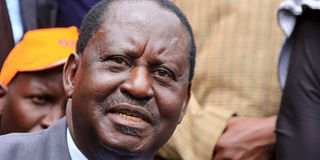Raila has a litany of political failures

Cord leader Raila Odinga addresses the media at Orange House in Nairobi on August 10, 2016. He is in talks with leaders of five other political parties to form a super alliance in his bid to unseat President Uhuru Kenyatta. PHOTO | JEFF ANGOTE | NATION MEDIA GROUP
What you need to know:
Disarmed of all his weapons and his political quiver emptied of all arrows, Cord leader Raila Odinga insists on marching forward to even greater failures in future.
Let him not say he was not warned.
Failure should be included as the middle name in all of Coalition for Reforms and Democracy (Cord) leader Raila Odinga’s official documents.
On May 31, 2014, Mr Odinga returned from a three-month exile in the United States after fleeing the spectacular failure of democracy in his party’s elections at the Kasarani Stadium.
He arrived with a list of unreasonable demands for dialogue in an attempt to evade Kenyans’ questions about the violence meted out by the Men-in-Black during the Orange Democratic Movement elections.
Mr Odinga threatened a host of calamities against the digital Jubilee administration if a national convention was not immediately called to overhaul security, confront corruption, give more money to counties and reform the Independent Electoral and Boundaries Commission (IEBC).
Here was a man who could not manage his own party pretending to lecture the legally-elected government of Kenya on how to manage the country, and over the past two years, he has received answers that should shut him up for good.
His plans to hold a rally on July 7, the iconic date associated with the struggle for the second liberation, turned out to be a political embarrassment of gargantuan proportions.
Instead of the usual sycophants turning up at Uhuru Park in Nairobi, police in riot gear were waiting for Mr Odinga to arrest him on sight.
And when he thought he could turn security into a political football, the President stole Major General Joseph Nkaissery right from under Mr Odinga’s nose and appointed him Cabinet Secretary for Interior and Coordination of National Government.
It is the self-same Mr Nkaissery, Mr Odinga’s former security advisor, who has been hitting his ex-boss with the sting of teargas in the streets and warning him against lawless behaviour.
Mr Odinga’s attempt to curry favour with county governments by demanding an allocation of 45 per cent of revenue instead of 15 per cent was quickly deflated in last year’s budget by doubling it to 30 per cent. The attempt to incite county governors, like Mr Odinga’s other political schemes, had failed.
ALL PEOPLE
Attempts to disorganise the President’s war on corruption have been abbreviated by sacking all the people Mr Odinga has tarred with the brush of graft.
Robbed of his favourite refrain, Mr Odinga is speechless in the face of the development delivered every day by the Jubilee administration.
He threatened fire and brimstone if his futile attempt to take Kenya through a needless referendum was not acceded to when he knew full well that his party officials cannot count a million signatures, seeing that they still operate in thousands and hundreds. Mr Odinga’s insistence on holding a referendum when he had already been defeated on all the issues he had raised is baffling.
All year, the Cord has been undermining public confidence in the IEBC, even occasionally threatening to boycott elections if the commissioners were not sent home and a new team put in place, contrary to the clear provisions of the law and the Constitution.
He even drew crowds of idlers into the streets to inhale teargas in an attempt to frustrate IEBC commissioners to resign but failed. It was only when the President took pity on Mr Odinga, on account of his personal friendship with him and out of consideration for his great age that the IEBC commissioners have been prevailed upon to leave office by September 30.
Disarmed of all his weapons and his political quiver emptied of all arrows, Mr Odinga still insists on marching forward to even greater failures in future.
Let him not say he was not warned.





